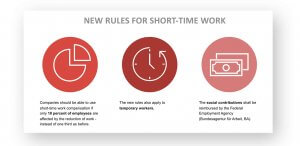Short-time work in times of the corona virus
Information on short-time work and short-time allowance for employers and employees
The corona virus has now virtually paralysed Germany and worse is to be expected. There will be restrictions in all industries, which will usually be associated with a loss of work or pay. In order to alleviate the economic burden this will cause, employers have the option of introducing short-time work and applying for short-time compensation.
The Federal Government has created substantial relief in this regard, which also helps smaller businesses and companies affected by a loss of work that does not affect the majority of employees.
Short-time allowance retroactive from March 1
Short-time allowance due to the corona crisis can be paid at short notice and applied for now. As Federal Labour Minister Heil announced, it will take effect retroactively as of 1 March and will also be paid out retroactively.

What is short-time work?
Short-time work is a temporary reduction in the normal working hours of a company. If the short-time work results in a temporary cessation of work, it is referred to as zero short-time work.
If a temporary shortage of work occurs, it may be necessary for the employer to order short-time work. In addition to economic reasons or structural changes in the company, the loss of working hours can also be caused by unavoidable events such as corona. The purpose of ordering short-time work is to reduce the burden on the company by lowering personnel costs and to ensure that jobs can be maintained.
Prerequisites for ordering short-time working
1. Legal requirements for ordering short-time working
The employer cannot unilaterally order short-time work without further ado. This must be agreed in advance. The right to unilaterally order short-time work may result from a collective regulation applicable to the employment relationship (collective agreement or works agreement) or directly from the employment contract. If the employment contract does not generally permit a unilateral short-time work order, the employer must first agree an intended short-time work with the employees concerned individually. Although such an individual agreement requires time and negotiation on the part of the employer and depends on the consent of the employee, it offers the advantage that it does not require the notice period for short-time work which would otherwise have to be observed.
For this reason, a supplementary agreement can also be useful if a provision already exists in the employment contract. At the same time, the employer can reserve the right to unilaterally order or extend short-time work at a later date, for example, in the event that the business closure lasts longer. The agreement on reduced working hours must be made before the introduction of reduced working hours, otherwise it is invalid. A special case of the introduction of short-time work even without an employment contract, works agreement or collective bargaining agreement is regulated by § 19 KSchG under certain conditions in the case of intended mass redundancies.
A simple sample of an agreement can be found here: Supplementary agreement on short-time work.pdf (64 KB)
First check the existing employment contracts to see whether there is already a provision for reduced working hours. This is usually found (at least in the contracts we draft) under “Working hours”. If there is a notice period for short-time work in the regulation, employers must comply with it or try to conclude a short-term additional agreement with the employees.
2. There must be a considerable loss of working hours with loss of remuneration
The absence from work must be due to certain legally recognised causes. It must be based on economic causes or an unavoidable event. An unavoidable event exists in particular if, for example, companies are closed down as a result of state protective measures, as is the case now. Even if the loss of working hours in companies with a high level of publicity is based on an official recommendation, short-time working is probably a possibility. The loss of working hours is considerable if at least one third of the employees receive a salary reduced by more than 10% due to the loss of working hours. The federal government is expected to reduce the number of employees affected to 10% when the implementing ordinance for the Labour of Tomorrow Act comes into force (see below). Short-time work does not have to be agreed to the same extent for the employees affected.
3. The loss of work must be temporary
A loss of working hours is temporary if the transition to full-time work can be expected with a certain degree of probability within the reference period. This is also to be assumed at the moment.
4. At least one worker must be employed in the establishment concerned
Employees who are in an employment relationship with the employer that is subject to compulsory insurance and has not been terminated are entitled to short-time work compensation. This means that small businesses are also entitled to short-time work.
5. The company must notify the Federal Employment Agency without delay of the loss of work
The employer must report the reduction of work as soon as possible to the employment agency in whose district the company is located. Short-time work compensation is generally paid at the earliest for the calendar month in which the notification is received by the employment agency. According to this regulation, it is sufficient if the notification is received on 31 March 2020, so that short-time work compensation is reimbursed, for example, as early as mid-March. Short-time allowance is only paid upon written application by the employer. The application for short-time allowance must be submitted using a form separate from the notification of the reduction of working hours. Employers should make absolutely sure to submit complete documents to prove that the conditions for short-time work are met (in particular contractual agreements, orders, change notices, etc.).
The application for the short-time work allowance (not the notification, which must be submitted by the end of the month) must be submitted to the responsible employment agency within a cut-off period of three months. The period begins at the end of the calendar month in which the days for which short-time allowance is applied for, lie.
Applications for both can be found on the website of the Federal Employment Agency: www.arbeitsagentur.de
Legal consequence: Entitlement to short-time working allowance
The ordering of short-time work leads to a (partial) cancellation of the main obligations arising from the employment relationship. The employee is released from the obligation to perform work, but at the same time loses the right to remuneration. If the working time is reduced, the employer therefore pays a correspondingly reduced salary. As compensation, however, he or she then receives a claim to short-time work compensation. The short-time allowance is paid to the employer by the Federal Agency. The employer calculates the short-time allowance himself and also pays it out to the employees. Accordingly, the employer must pay the short-time allowance until the Federal Employment Agency makes the payments to the employer. To receive reimbursement, the employer must obtain confirmation that the employees have received the reduced hours compensation. The employer can also request to be exempted from this obligation in the application form for short-time allowance.
Short-time work allowance is a benefit paid from unemployment insurance. It is not subject to income tax and does not constitute remuneration within the meaning of social insurance. The statutory period of entitlement is a maximum of 12 months. It can be extended to up to 24 months by a statutory order of the Federal Ministry of Labour and Social Affairs. The subsidy amount is calculated on the basis of the net loss of earnings. As a rule, short-time workers receive 60% of the lost flat-rate net remuneration. If there is at least one child living in the household, the short-time working allowance is 67% of the lost flat-rate net remuneration.
Employees remain insured in all branches of social insurance, even if they are completely unable to work or if short-time work is zero. If the employee receives so-called short-time pay for work actually continued, the employee and the employer each pay half of the social insurance contributions resulting from this remuneration. The supplement to the nursing care insurance for the childless is borne by the employee alone, even during short-time work.
The effective introduction of short-time work between employer and employee is legally independent of the granting of short-time work compensation by the Federal Employment Agency. The working time is reduced regardless of whether the employer duly notifies the short-time work and applies for short-time work compensation. The employer is obligated to the employee to submit the notification to the Employment Agency in a timely and proper manner and to provide it with all information necessary to calculate the short-time work allowance. According to case law, the employer is in principle only obliged to take legal action against a negative decision in “exceptional cases”. Employees are not entitled to assert their claims for short-time work compensation themselves.
If short-time work has been ineffectively agreed upon, the employer is obliged to pay the employee default compensation in the full amount of the normal compensation. If short-time work has been effectively agreed or ordered, but there is no entitlement to short-time work compensation, the employer is liable to the employee in the amount of the short-time work compensation.
Draft law – facilitated access to short-time work
On 10 March 2020, the Federal Cabinet prepared the draft law “Work of Tomorrow Act”. The aim of the law is to facilitate access to short-time work due to the corona virus. In order to be prepared for times of crisis, an ordinance authorization for the federal government, limited until the end of 2021, is to be included in the law, which will allow easier access to short-time work compensation and relieve companies. This measure is intended to benefit above all companies affected by the effects of the corona virus.
The draft law contains the following facilitation for the ordering of short-time work:
In the future, the threshold for short-time work will be lowered: Subsidies for wage costs will already be available if 10 percent of the workforce is affected by lost work. The threshold has so far been one third of the workforce.
ATTENTION: This 10 percent does not have to apply to the entire company. Even organizationally separable departments can be used for the calculation.
It should be possible to completely or partially dispense with building up negative working time balances before payment of the short-time working allowance. The applicable law requires that in companies where agreements on working time fluctuations are used, these are also used to avoid short-time work and are driven into the red.
It is also new that the short-time allowance should also be paid for temporary workers for a limited period of time.
In addition, social security contributions are also to be paid by the Federal Employment Agency under certain conditions. Until now, employers have had to pay these at least proportionately, which required a complicated calculation procedure.
According to the current status (16 March 2020), the ordinance for the implementation of these relief measures will be drawn up next Wednesday 18 March 2020 at the earliest and will probably enter into force in the first half of April.
UPDATE:
Short-time allowance retroactive from March 1
Short-time allowance due to the corona crisis can be paid at short notice and applied for now. As Federal Labour Minister Heil announced, it will take effect retroactively as of 1 March and will also be paid out retroactively.
Conclusion: short-time work may be an unknown and also frightening measure for most employers. However, short-time work compensation is firstly easy to apply for and secondly is often the only way to avoid dismissals.



